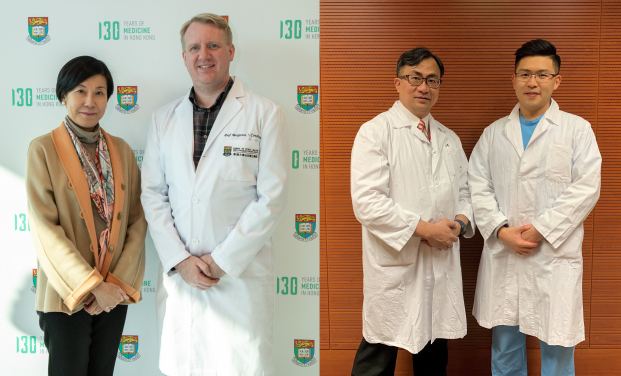Media
HKU researchers report high influenza vaccine effectiveness
in Hong Kong, 2018-19 winter
25 Jan 2019

(From left to right) Dr Susan Chiu, Clinical Associate Professor of the Department of Paediatrics and Adolescent Medicine, HKUMed; Professor Benjamin J Cowling, Head of Division of Epidemiology and Biostatistics, WHO Collaborating Centre of Infectious Disease Epidemiology and Control, School of Public Health, HKUMed; Dr Mike Kwan, Consultant and Dr Joshua Wong, Associate Consultant of the Department of Paediatrics and Adolescent Medicine, Princess Margaret Hospital, are among the members of the research team who conducted the research.
Hong Kong is currently experiencing its winter influenza season. According to our past research1, each year in Hong Kong, an average of 12,700 respiratory hospitalizations and 431 respiratory deaths are attributable to influenza. The exact impact varies from year to year, depending on the circulating strains, with influenza A(H3N2) epidemics tending to have the highest impact. This winter Hong Kong is experiencing an epidemic of influenza A(H1N1).
Influenza vaccines are the most widely used vaccines in the world, and around 1,000,000 doses were administered so far this autumn and winter in Hong Kong according to the Centre for Health Protection.2
Research methodology and findings
Since 2015, the Medical Faculty of The University of Hong Kong (HKUMed) has been collaborating with Queen Mary Hospital, Princess Margaret Hospital and Yan Chai Hospital to monitor influenza vaccine effectiveness each year.3 Using well-established methods that are used in many other countries around the world to continuously monitor vaccine effectiveness, a research team, comprising Dr Susan Chiu, Professor Ben Cowling and Professor Malik Peiris from HKUMed and Dr Mike Kwan and Dr Joshua Wong from Princess Margaret Hospital, has enrolled children who are admitted to these hospitals with an acute respiratory illness including a fever and other respiratory symptoms, and determined which children had recently received influenza vaccination and which children were infected with influenza. By comparing vaccination status between children with influenza and without influenza, the research team makes an estimate of the effectiveness of influenza vaccination in preventing hospitalization.
Most recently, the research team conducted a hospital-based study in Hong Kong to estimate the effectiveness of influenza vaccination for the winter of 2018/19. In this analysis, the team included data on 2,016 children who were admitted between September 2, 2018 and January 11, 2019 with acute respiratory illness with fever and who were tested for influenza. There were 344 children with laboratory-confirmed influenza, among which 85% had influenza A(H1N1). Using the data collected on these children, the team estimated that influenza vaccination effectiveness was 90%, meaning that the chance of being hospitalized due to influenza was reduced by 90% in children who had received the influenza vaccine when compared to those who had not received the vaccine this season.
Professor Ben Cowling, Head of Division of Epidemiology and Biostatistics at the School of Public Health, HKUMed, and researcher at the WHO Collaborating Centre of Infectious Disease Epidemiology and Control, said: “This is the first local estimate of the performance of the influenza vaccine in Hong Kong this winter, and reassures us that the vaccine is very effective against the locally circulating strains which are well matched to the vaccine.”
Dr Susan Chiu, Clinical Associate Professor of Department of Paediatrics and Adolescent Medicine, HKUMed added: “These results once again indicate that influenza vaccination is effective. It is unfortunate that most of the children with severe influenza diseases had not been vaccinated this season. Looking forward, it is important for parents to get their children vaccinated in October and November each year, before the influenza season starts”.
Dr Mike Kwan, Consultant of the Department of Paediatrics and Adolescent Medicine, Princess Margaret Hospital said: “School-based influenza vaccination is an efficient way to protect school children against influenza. The pilot programme should be expanded to cover all children in Hong Kong.”
About the Research Team
The research was conducted by: Dr Susan Chiu, Clinical Associate Professor of the Department of Paediatrics and Adolescent Medicine, HKUMed; Professor Benjamin J Cowling, Head of Division of Epidemiology and Biostatistics, WHO Collaborating Centre of Infectious Disease Epidemiology and Control, the School of Public Health, HKUMed; Dr Mike Kwan, Consultant and Dr Joshua Wong, Associate Consultant of the Department of Paediatrics and Adolescent Medicine, Princess Margaret Hospital; Professor J. S. Malik Peiris, Tam Wah-Ching Professor in Medical Science and Chair Professor of Virology at the School of Public Health, HKUMed.
Researchers in Hong Kong have a world-class reputation in research on influenza viruses. Researchers in the School of Public Health, HKUMed are supported by a large commissioned grant from the Health and Medical Research Fund, under the Food and Health Bureau of the HKSAR government. The School of Public Health, HKUMed, is designated as a WHO Collaborating Centre for Infectious Disease Epidemiology and Control, the first such centre at the University.
Media Enquiry
Please contact LKS Faculty of Medicine of The University of Hong Kong by email ([email protected]).
References
1. Wu P, Presanis AM, Bond HS, Lau EHY, Fang VJ, Cowling BJ. A joint analysis of influenza-associated hospitalizations and mortality in Hong Kong, 1998-2013. Sci Rep. 2017; 7(1):929. https://www.nature.com/articles/s41598-017-01021-x
2. Centre for Health Protection. Statistics on 2018/19 Vaccination Programmes / Schemes. Available from: https://www.chp.gov.hk/en/features/26734.html Last accessed on Jan 18 2019.
3. Cowling BJ, Chan Chan KH, Feng S, Chan EL, Lo JY, Peiris JS, Chiu SS. The effectiveness of influenza vaccination in preventing hospitalizations in children in Hong Kong, 2009-2013. Vaccine. 2014;32(41):5278-84. https://linkinghub.elsevier.com/retrieve/pii/S0264-410X(14)01051-2
